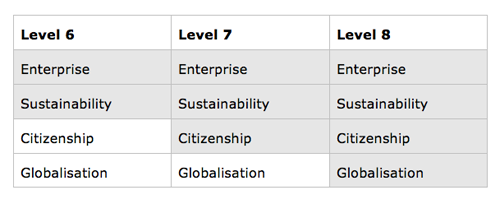Learning programme design
"In curriculum planning there needs to be emphasis on skills for our future society. These should include much greater emphasis on information technology, new forms of work, multicultural and globalised society and business, and environmental issues. Because the rate of change is now so great, these issues need to be reflected in current secondary and tertiary curriculum. They need to reflect changes in work patterns and philosophies, the growing cultural pluralism of our society, our increasing focus on Asian markets, and environmental and technological changes."
'The Development of Enterprise and Management Skills', NZIM Briefing Paper, 13 September 2005, p. 12
Business studies is usually offered as a course in secondary schools at years 11, 12, and 13, although some schools also offer optional and/or modular courses from year 9.
Structuring business studies courses
When structuring business studies courses, schools need to consider their students’ talents, needs, and aspirations, the needs of the community, the school’s goals, and what else is offered in the senior school. Opportunities for alignment with wānanga and other providers of tertiary business education can also be considered.
Teachers need to plan what content will be covered, in order:
- to limit duplication
- to ensure that there is a progression of depth and breadth in learning
- to ensure that students remain motivated and engaged in learning.
The sections on key competencies, values, and principles in The New Zealand Curriculum and on Ngā Matapono Whānui (principles) and Ngā Uara, Ngā Waiaro (values, attitudes) in Te Marautanga o Aotearoa set out curriculum requirements that are directly applicable for teaching and learning in business studies, as in other subjects or learning areas.
Use the potential of business learning to support the wider curriculum, including development of all
five key competencies, and exploration of
future focus themes and
values.
TOP
Future focus themes in business studies
The four future focus themes identified in the curriculum are the four key concepts in business studies. Each should be addressed to some extent in every business studies programme but, as the following table shows, the focus changes over the three senior years.

Future focus themes in business
See also:
TOP
Business themes
Teaching and learning programmes should be designed around the following five business themes, which collectively encompass business knowledge, content, and concepts:
- Business formation
- Functions of business
- People in business
- Business management
- Business environment
Click for an outline of content that is appropriate at each of the three senior levels:
When designing programmes, teachers should carefully consider their students’ talents, needs, and aspirations, and what they will need to know and be able to do in order to take the subject with confidence in the following year(s).
Last updated November 29, 2011
TOP


